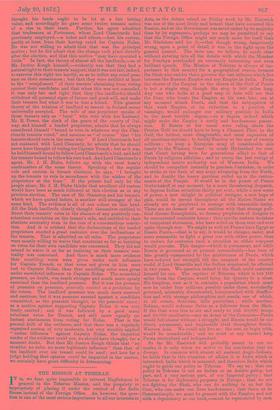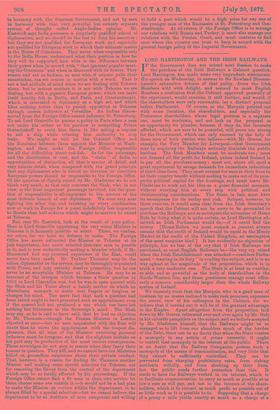THE MISSION AT TEHERAN.
TT is, we fear, quite impossible to interest Englishmen in general in the Teheran Mission, and the propriety or impropriety of placing it under the control of the India House instead of the Foreign Office. As, however, the ques- tion is one of the most serious importance to all our interests in Asia, as the debate raised on Friday week by Mr. Eastwick was one of the most lively and honest that have occurred this Session, and as the Government was saved rather by its majority than by its arguments, perhaps we may be permitted to say that the 'Foreign Office might say much more for itself than Mr. Gladstone said for it,—that though wrong, dangerously wrong, upon a point of detail, it was in the right upon the general quarrel. The facts can, we believe, be made clear without entering into all the details with which the Member for Penrhyn overloaded an extremely interesting and even brilliant speech. The Mission at Teheran is always of im- portance to this country for a geographical reason, because the Shah who resides there governs the vast isthmus which lies between the Russian Empire and our Empire in India. From the shores of the Caspian to the shores of the Gulf of Persia is but a single step, though the step is 500 miles long. Any one who looks at a good map of Asia will see that the Czar, who treats the Caspian as his own lake, can at any moment attack Persia, and that the subjugation of that weak Empire, or its redaction to a position of vassalage, would endanger our military position in India to the most terrible degree,—to a degree indeed which might make the Empire a costly and burdensome posses- sion. If Russia or her vassal were ruling above the Persian Gulf we should have to keep a Channel Fleet in the Gulf, the hottest, most disagreeable, and most expensive of all maritime stations ; to fortify Bombay at the cost of twenty millions ; to keep a European army of considerable size handy to the Western Coast ; to crush Hyderabad for ever, that Court having been for generations allied to that of Persia by religious affinities ; and to sweep the last vestige of independent native authority out of Western India. We should be compelled instantly to garrison Candahar, in order to strike at the flank of any army advancing from the North, and to double the heavy garrison coiled up in the canton- ments of the Punjab. It would be in the power of Prince Gortschakoff at any moment, by a mere threatening despatch, to depress Indian securities thirty per cent., while a new sense of power, a new delight in political intrigue, a new hope of gain, would be spread throughout all the Native States we already are so perplexed to manage with reasonable lenity. These are no dreams of men smitten with that strange poli- tical disease Russophobia, no dreamy prophecies of dangers to be encountered centuria hence ; they are the mature decisions of competent statesmen, who have acted on them over and over again through war. We might as well let France have Egypt as Russia Persia,—that is to say, it would be cheaper, easier, and more reasonable to fight a great war with either power, than to endure for centuries such a situation as either conquest would provoke. This danger—which is permanent, and while Russia is governed as at present irremediable—has been of late greatly exasperated by the misfortunes of Persia, which have reduced her strength till the conquest of the country could, if Lord Granville and the Sultan acquiesced, be effected in two years. We question indeed if the Shah could maintain himself for one. The capture of Teheran, which is but 100 miles from the Caspian, would bring his dynasty to a close. His kingdom, vast as it is, contains a population which must now be under four millions, possibly under three, wretchedly governed, miserably discontented, honeycombed with disaffec- tion and with strange philosophies and creeds, one of which, at all events, Sufeeism, kills patriotism ; while another, Babism, would welcome Satan as a deliverer from the Shah. If the Czar were free to act and ready to risk 30,000 troops and 50,000 auxiliaries—say an Army of the Caucasus—Persia would fall almost without a struggle, and Russia would be our direct, permanent, and implacable rival throughout South- Western Asia. We could not live so ; the cost, to begin with, would be unendurable ; and we must at any hazard keep Persia neutralised and independent.
So far Mr. Eastwick will probably assent to our re- marks, it is only when we arrive at his conclusion that we diverge. In common with almost all eminent Anglo-Indians, he holds that in this situation of affairs it is India which is interested, India which is menaced, and therefore India which ought to guide our policy in Teheran. We say no ; that our policy in Teheran is not an Indian or an Asiatic policy, but part, and a very serious part, of our Imperial policy ; that Teheran is for diplomatic purposes in Europe ; that we are not fighting the Shah, who can do nothing to us, but the Czar, who can make our lives burdensome ; that there, as in Constantinople, we must be present with the Empire, and not with a dependency at our back,—must be represented by men in harmony with the Supreme Government, and not by men in harmony with that very powerful but entirely separate system of thought called Anglo-Indian opinion. Mr.
Eastwick says India possesses a singularly qualified school of
diplomatists, and we should be the last to deny his assertion ; but they are not qualified for European work, and especially not qualified for European work in which their ultimate master is the House of Commons. They never, when responsible only to the India House, understand what their position is, how far
they will be supported, how wide is the difference between their power when in accord with "that ignorant popular meet- ing the Commons" and when in disaccord with its desires. They reason and act as Indians, as men who, if anyone pulls their moustaches, can set armies in motion with a word. That is not a bad attitude of mind when we are dealing with Teheran alone, but in serious matters it is not with Teheran we are dealing, but with a gigantic European power, which can make itself heavily felt in Berlin, and Paris, and Constantinople, which is interested in diplomacy as a high art, and which likes nothing better than to punish opposition in Teheran through unseen influence at Versailles. An Indian discon- nected from the Foreign Office cannot influence St. Petersburg. To ask Lord Granville to pursue a policy in Paris when a man not under his orders or his purview is compelling Prince Gortschakoff to resist him there, is like asking a captain to sail a ship while refusing him authority to stop leaks. We might as well let the Colonial Office and the Dominion between them appoint the Minister at Wash- ington, and then make the Foreign Office responsible for all the difficulties about cod-fish. As for the patronage, and the distribution of cost, and the "claim" of India to opportunities of distinction, all that is matter of detail, and very minute detail, when compared with the grand principle that any diplomatist who is forced to threaten or conciliate European powers should be responsible to the Foreign Office. Of the question of dignity raised by Mr. Gladstone we do not think very much, as that only concerns the Shah, who, in our view, is the least important personage involved, but the ques- tion of responsibility is all-important to the success of the most delicate branch of our diplomacy. We were very near fighting the other day, and breaking up every combination now at work in Europe for a point indefinitely less important to Russia than half-a-dozen which might to-morrow be raised at Teheran.
But, says Mr. Eastwick, look at the result of your policy. Here is Lord Granville appointing the very worst Minister to Teheran it is humanly possible to select. There, we confess, we retire, for we have no defence to make. The Foreign Office has never estimated the Mission at Teheran at its just importance, has never selected first-rate men to preside in it, and is now undoubtedly making a blunder which, if Mr. Hammond had any personal experience of the East, could never have been made. Mr. Taylour Thomson may be the ablest diplomatist in the service, may be thoroughly acquainted with Persia, and may entirely deserve promotion, but he can never be an acceptable Minister at Teheran. He may be as innocent of the intrigue which became a State question in 1855 as Lord Clarendon was, but he was in open quarrel with the Shah and his Vizier about a family matter on which no Mussulman monarch or noble ever forgets or forgives or changes his mind. The mere fact that such a question had been raised ought to have prevented such an appointment, even if the quarrel had not produced a war which can have left nothing but bitterness in the Sovereign's mind. The Shah may say, as he is said to have said, that he had no objection to Mr. Thomson—though the Persian Minister in London objected at once—but no man acquainted with the East will doubt that he views the appointment with the deepest dis- pleasure, that all hope of the Minister exercising personal influence must be foregone, and that the slightest mistake on his part may be productive of the most serious consequences. These sovereigns do not stop to reason when they fancy their honour in question. They kill, and we cannot have our Ministers killed on groundless suspicions about their private conduct. That, however, is a reason for finding Mr. Thomson another Mission and making some special selection for Teheran, not for removing the Envoy from the control of the department which may be so fatally affected by his proceedings. If the Foreign Office cannot find a fit man in their own service, let them choose some one outside it,—it would not be a bad plan to make the Mission an enclave within the department, to be always filled by a special selection—but we cannot believe the department to be so destitute of men competent and willing to hold a post which would be a high prize for any one of the younger men of the Embassies at St. Petersburg and Con- stantinople. At all events, if the Foreign Office is to manage our relations with Russia and Turkey, it must also manage our relations with the Persian Court, and must contrive to find men whom the country can trust to keep in accord with the general foreign policy of the Imperial Government.



































 Previous page
Previous page